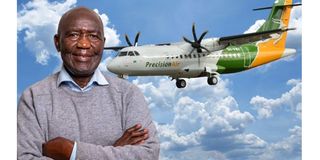Michael Shirima’s roller-coaster journey in the aviation industry

Combined photo of the founder of Precision Air, the late Michael Shirima and one of the airline plane.
What you need to know:
- He was among the executives who founded Air Tanzania Corporation (ATC), the precursor of Air Tanzania Company Limited (ATCL).
- Later on, about 30 years ago, he founded PrecisionAir, the largest private airline in the country which continued to dominate the skies in Tanzania and some neighbouring countries.
Arusha. By all standards, he was one of the city tycoons – often rubbing shoulders with the high and mighty.
Business would always dominate his conversation not without mentioning the challenges he faced as an aviation sector executive.
Michael Shirima, who breathed his last on Friday night, devoted much of his life in raising the country's stake in aviation.
He was among the executives who founded Air Tanzania Corporation (ATC), the precursor of Air Tanzania Company Limited (ATCL).
Later on, about 30 years ago, he founded PrecisionAir, the largest private airline in the country which continued to dominate the skies in Tanzania and some neighbouring countries.
But it has not been a walk in the park. His dreams have been subjected to turbulence similar to a small aircraft cruising the skies in bad weather.
He was forced to quit ATC over alleged gross interference by senior government officials on the state-owned airline operations.
It was an easy ride when he opted for private airline operations. The business environment was not all that conducive at that time.
The deal between PrecisionAir and Kenya Airways (KQ) had some political tones as Kenya had been a leading competitor with Tanzania.
Nonetheless, PrecisionAir soldiered on and he was credited for the feat such that President Samia Suluhu Hassan described him as "an important stakeholder in the country's aviation industry".
The late Shirima, who died at the age of 80, was one of the Tanzanian technical staff who were deployed home after the collapse of the once reputed East African Airways (EAA).
He joined the then young national carrier, founded in April 1977, as the director of operations, a no mean task as he was one of the executive directors.
But he was soon to land in trouble with the top management and the Board of Directors over the way the airline was managed.
In one of the past interviews, he said, he tried his best to put his ideas across the board on the way the airline should be run efficiently and profitably.
He had reached a point where he was convinced that ATC can no longer be viable or earn a reputable status if the advice of the technical staff continued to be downplayed.
Finally, he made a bold move and quit on January 10, 1979 after "carefully evaluating the position of the airline".
His early exit was prompted by what he described as his discomfort with the interferences "from above" which impacted on the operations.
He cited incidents where passengers on board had to disembark so that the aircraft were deployed to pick some VIPs from some airports.
"One cannot operate a civil air transport corporation this way and call that corporation a national airline,” he said in his resignation letter.
In his opinion, that was not the best thing for the management to do because there were better options to address such cases, including consulting with the technical staff.
He believed he and his staff members (in the Operations Department) were made scapegoats in one way or another and seen to disobey directives from their seniors.
One would have thought Mr Shirima was destined to hang his gloves in the aviation sector for his stern letter submitted on January 10, 1979.
He was categorical that he had personally supported the growth of the country's aviation sector since the days he worked with the defunct EAA.
"I have made sacrifices which in some cases have exposed me to certain risks,” he said in his resignation letter obtained by The Citizen in 2012.
He, however, lauded the way the government evacuated its nationals from Kenya - then the headquarters of the EAA - after the collapse of the regional airline.
Once outside the ATC, the late Shirima set his eyes on aerial crop spraying using a hired aircraft with Arusha airport as his base.
But this was not to last long. Much of the spraying took place on the wheat and barley farms in Arusha, Manyara and Kilimanjaro regions.
The ugly head of drought descended in - that was some time in the 1980s - and the project was called off.
He changed tact and ventured into an activity seemingly far away from aviation by setting up Rombo Millers for crop processing.
It was here where his insiders say he got initial capital to bring to reality his dreams; he purchased a charter plane.
Later on he secured funds from the Tanzania Venture Capital Fund from which he would set up PrecisionAir for scheduled passenger service.
Flight Captain Philemon Kisamo, was once in charge of the fleet and had good memories of the man behind the largest private airline in the country.
"We were together from the crop spraying business to the time PrecisionAir had a stake in the region's aviation industry,” he said.
Capt Kisamo told The Citizen a few hours after the demise of Mr Shirima that he hoped PrecisionAir would continue flying after his departure.
The late Shirima admitted in a recent interview that his airline capitalised on the downfall of ATC in the 1990s to emerge in the market.
"The new airline showed some strength during the early days but was short-lived" he said in his memoirs obtained by The Citizen.
He said PrecisionAir was compelled to enter into a deal with Kenya Airways (KQ) in 2003 on promise that the latter would inject $12 million.
KQ bought into PrecisionAir in what analysts viewed as a deliberate move to protect its dominance in the regional market.
At that time, South African Airways (SAA), which was then in its heyday, had bought into ATC, which was up for sale from 2002.
KQ had initially shown interest to buy ATC but did not submit its bid, opening the way for SAA to clinch it.
PrecisionAir was incorporated in Tanzania in January 1991 as a private airline and started operations in 1993.
At first, it operated as a private charter air transport company, but in November 1993, it changed to offer scheduled services to serve the growing tourist market.
In 2006, the private airline, which initially operated from Arusha later relocating to Dar es Salaam, became the first Tanzanian airline to pass the IATA Operational Safety Audit.
In 2003, Kenya Airways acquired 49 percent shareholding in Precision Air for a cash sum of $2 million.


